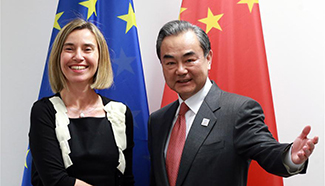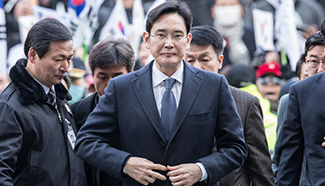BEIJING, Feb. 17 (Xinhua) -- China's diminishing forex reserve, now below the closely-watched 3 trillion U.S. dollar mark, has triggered market concerns, but two advisors to the Chinese central bank believe that such worries are overblown.
The decline does not warrant such worries, and was indeed a good thing,according to Fan Gang, a Chinese economist and member of the monetary policy committee of the People's Bank of China (PBOC), the central bank.
China's forex reserve dipped to about 2.998 trillion dollars in January, down from about 3.01 trillion dollars in December 2016, representing the seventh consecutive monthly contraction, State Administration of Foreign Exchange data showed last week.
"A large chunk of Chinese forex reserve was used to purchase U.S. treasuries, which can only yield low investment return," Fan said during a recent interview with China Securities Journal, a newspaper run by Xinhua.
China slightly boosted its holding of U.S. treasuries by 9.1 billion dollars in December 2016 with the total holding standing at about 1.06 trillion dollars, after trimming its holding for six consecutive months. Japan last year overtook China as the largest holder of U.S. government debt.
Fan, also deputy head of the China Society of Economic Reform, said that the investment efficiency of China's forex reserve has been a continuing debate for years, as some observers hold that China's forex reserve investment overseas is of low efficiency while foreign investors can reap higher returns in China.
Fan said that from the perspective of investment efficiency, the drop of China's forex reserve was a good thing, adding that the decline of Chinese government's forex reserve was accompanied by more forex reserve held by Chinese households, and the private sector could aim for investments like stocks and bonds that yield higher returns.
In 2007, China increased the quota for individual forex purchases from 20,000 dollars per person a year to 50,000 dollars.
"After the RMB was added to the International Monetary Fund's Special Drawing Right basket, China's need for forex reserve may further decrease," Fan said.
When asked about the exchange rate of Chinese currency renminbi, Fan said that he believed that the bigger question was the strength of the dollar in the near and longer term.
The strength of the greenback hinges on factors such as the tax cut plans of the Trump administration and the pace of interest rate hikes from the Federal Reserve, he added.
Like some major currencies, the renminbi weakened against the strengthening dollar in 2016 as the U.S. economic recovery and expectations of U.S. interest rate hikes helped the greenback.
Despite the recent decline, China still has the largest stash of forex reserve in the world, and it is at an abundant level, said Li Daokui, a former member of the PBOC monetary policy committee.
"China should be alert to the rapid depletion of the forex stockpile," Li, also an economics professor at Tsinghua University, said during a recent interview with China Securities Journal.
"A large part of Chinese financial assets exist in the form of savings and they are very liquid," Li said, adding that further RMB depreciation and capital outflow would add to the pressure of forex reserve decline.
Li predicted that pressure on RMB depreciation could ease in the second half of this year as some of policies of the Trump administration might not deliver the intended results and appreciation of the dollar could slow.
The Chinese currency continued its recent strength and rose to a more than three-week high against the dollar Friday. The central parity rate of the yuan strengthened 173 basis points to 6.8456 against the dollar Friday, edging up for the fourth consecutive day.












